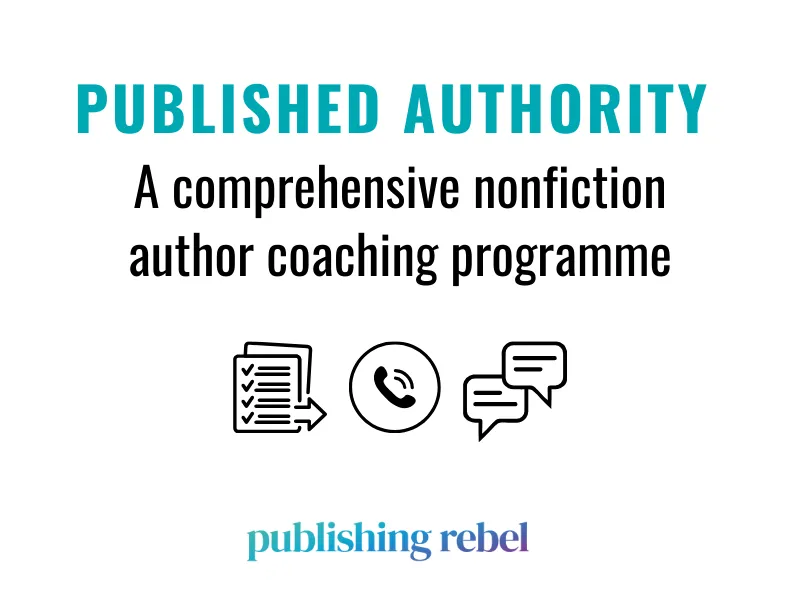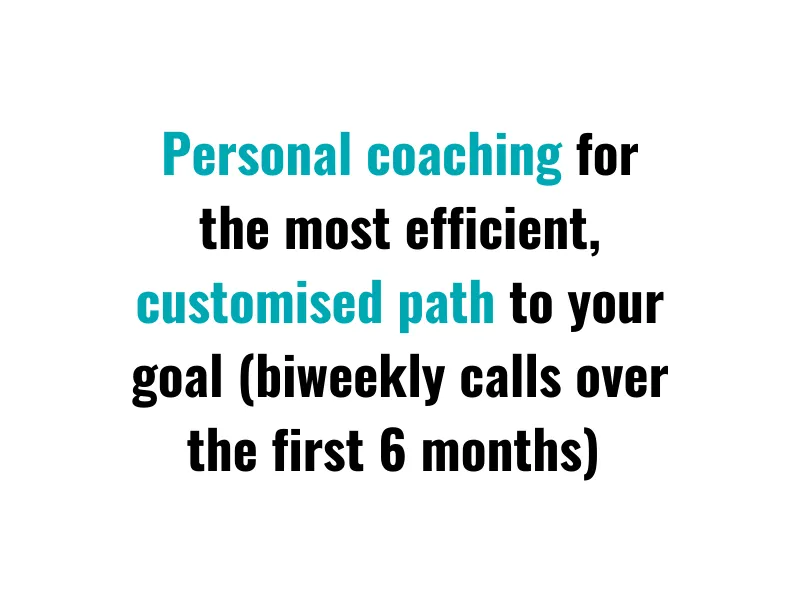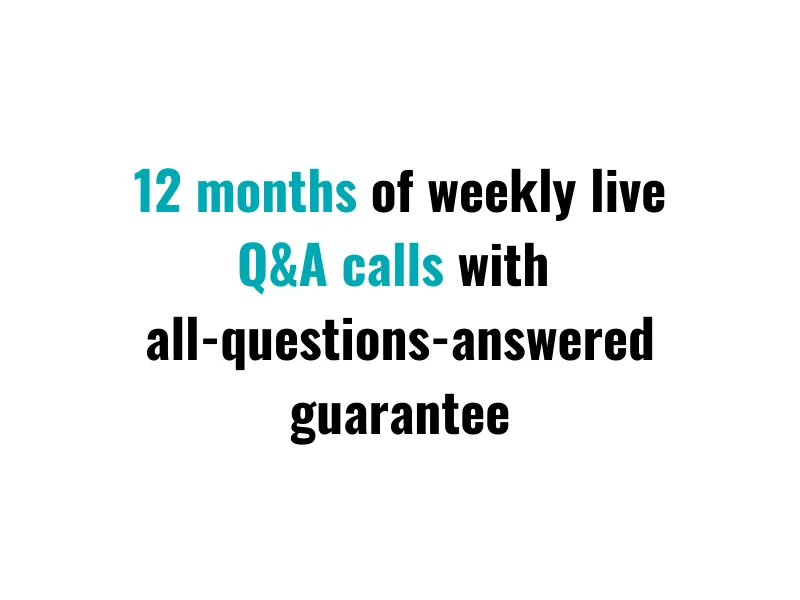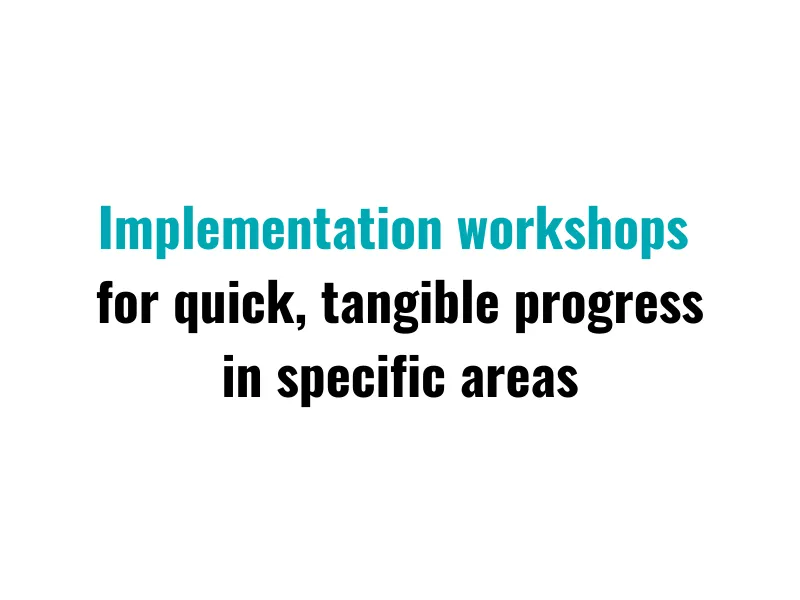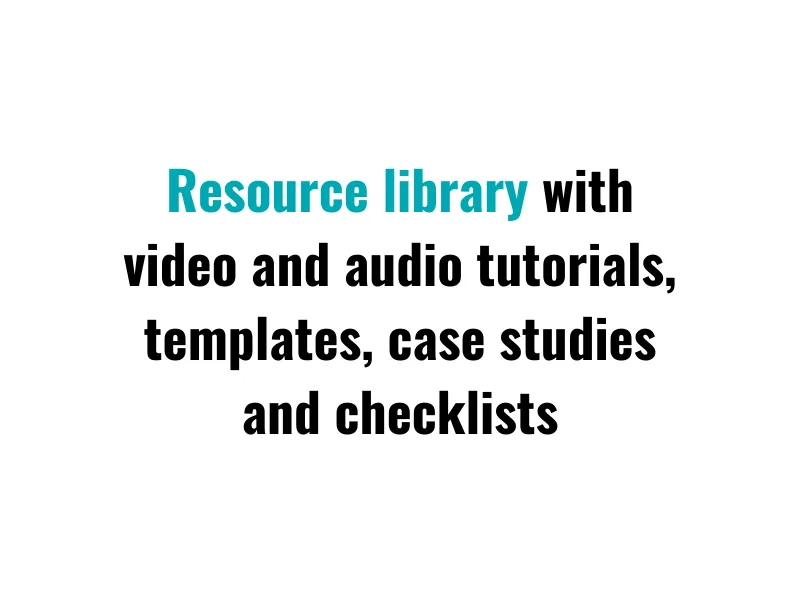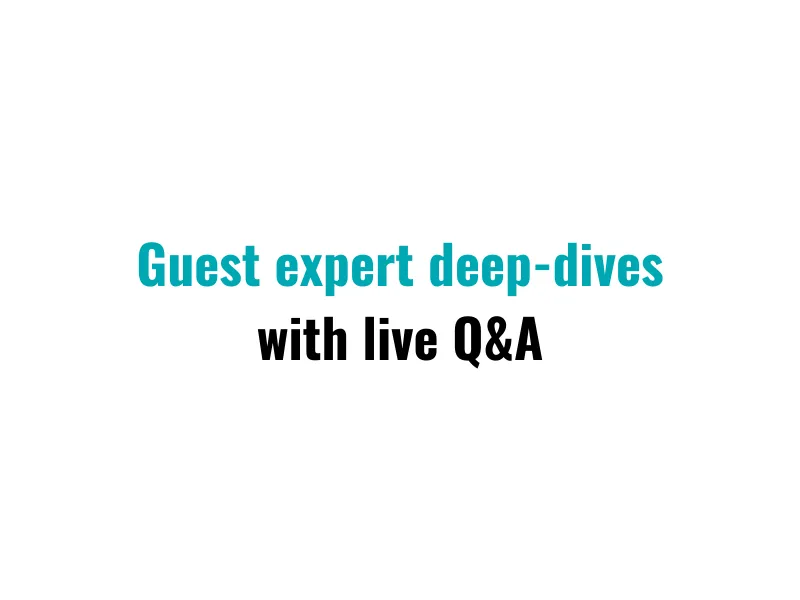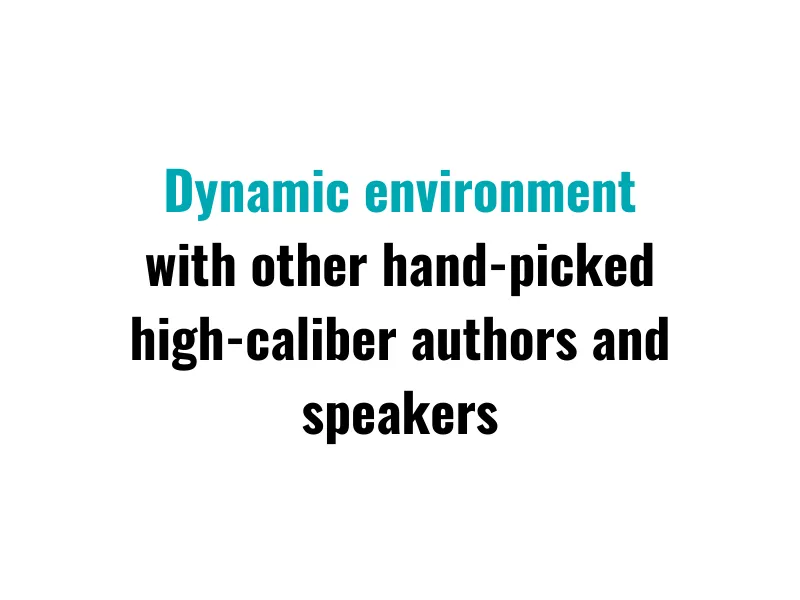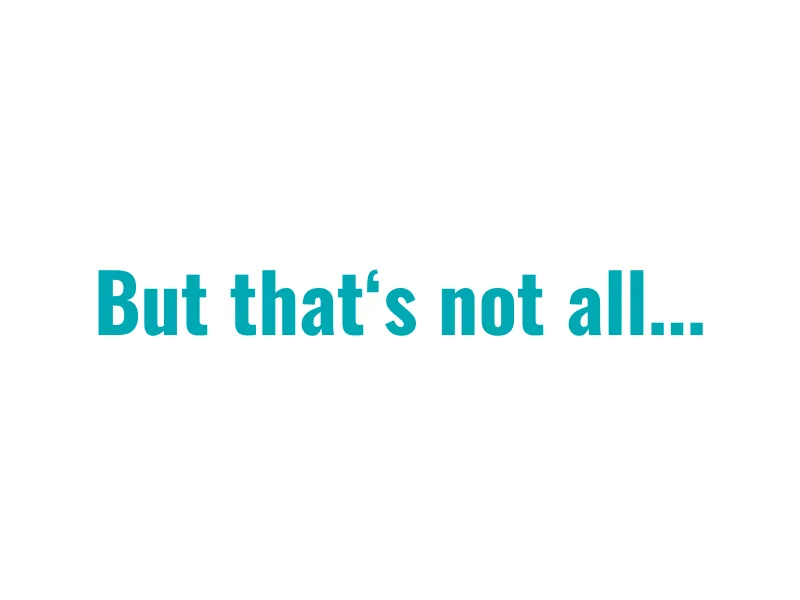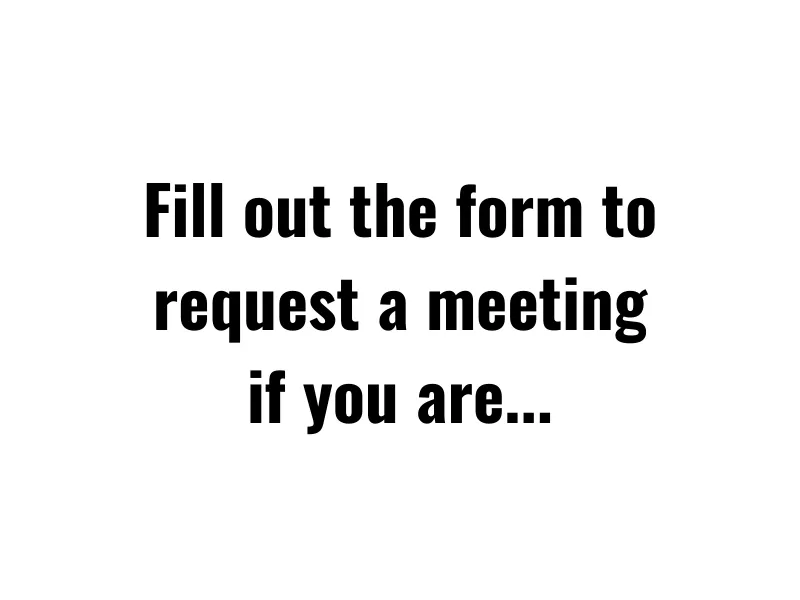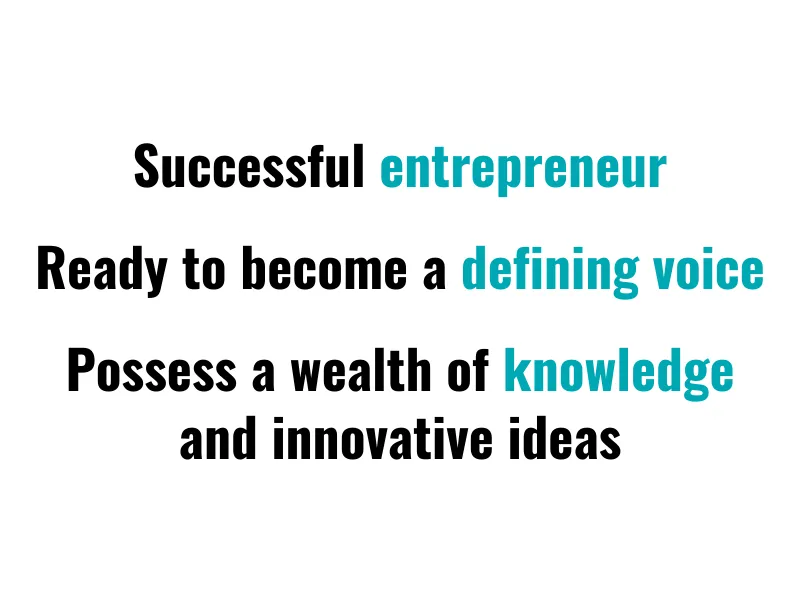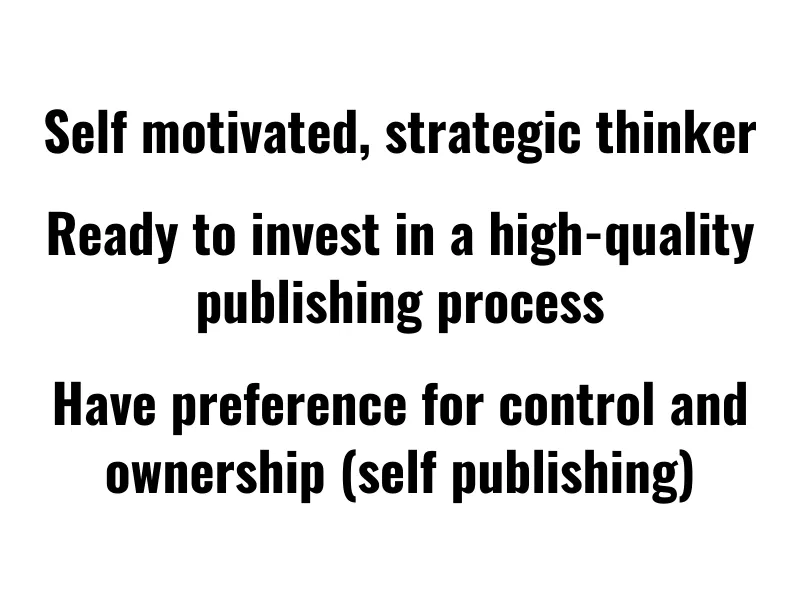PUBLISHED BOOK + REACH + CONVERSION =
FastTrack to Becoming a Known Authority
Become a DEFINITIVE VOICE in your field with a branded nonfiction book that attracts your most profitable clients and speaking gigs
Work 1:1 with Your Personal Book Coach/Editor
FastTrack to Becoming a Known Authority
Become a DEFINITIVE VOICE in your field with a branded nonfiction book that attracts your most profitable clients and speaking gigs.
From IDEA to PUBLISHED - maintaining 100% ownership and 100% control.
Quick links...
Let me guess...
While you've established yourself as an expert in your area of expertise, you feel you haven't fully leveraged your knowledge to cement your authority and legacy.
You want to publish a book that can take you to the next level where you are recognised as a definitive voice in your field, allowing you to enjoy more freedom, work with only the most exciting customers, and expand and explore new business avenues.
But translating your expertise into a compelling narrative and create a book that is worthy of your brand (and navigating the publishing world) just raises so many questions that you keep postponing the project.
You are looking for an experienced book coach who knows how to get it done.
You found her ;)


It changed the look and feel of my book completely!
Susanne Skov Diemer
International Security Expert

Malene brilliantly worked out the positioning of my book digging deep into market data. We went back and reworked the manuscript to fit what readers were actually looking for!

I gained so much clarity on my business in the process!
Gitte Madelaire
Energetic Leadership Facilitator

Having a coach who understands business and leadership has been invaluable. Malene is a genius when it comes to getting clarity on the concept and creating flow throughout the book!

Opportunities started ticking in already at pre-launch!
Sarah Clay
LinkedIn Advocay Expert

Writing a book is challenging when you are already busy. Malene kept me on track, driving me forwards all the way. She also made it fun! The impact of being an author is already showing!

Our customers love that we provide real books!
Ole & Jenni Jepsen
Agile Coaches

We wanted our book to enhance learning during our workshops and that is exactly what Malene helped us create. Providing a book to the participants builds immediate trust. Thank you!

How do you write a book about using less text?
Lise Grastrup
Graphic Facilitator

I struggled to find the right angle but Malene helped me nail it and kept challenging me to go deeper on why people should learn to draw. Students in my online courses love the book!
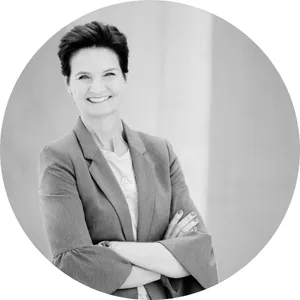
My books have taken my speaking to the next level!
Merete Bergmann Smit
Customer Service Expert

I've published two books and am now translating them. Becoming an author has had a profound impact on my business. I get more requests for talks and keynotes than I can say yes to!
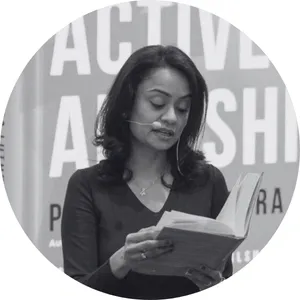
Publishing books has opened many new doors!
Dr. Poornima Luthra
DEI & Allyship Expert

Malene has helped me publish three books which opened the doors to major international publishers, more talks and keynotes, and many other exciting opportunities.

3 months from idea to Amazon bestseller
Vikingmoms
Nordic Parenting Experts

We were surprised to learn that proper planning of the content is far more important than the actual writing. We went from idea to proof read manuscript in 21 days and reached bestseller status in just over 3 months!

The cover design and layout is fantastic!
Charlotte Nytoft
Expert in US-Nordic Export

Malene only works with the best people and I realised early on that she was already visualising my book and helped me adapt the manuscript so the book would also turn out beautiful and on-brand. I love it!

It changed the look and feel of my book completely!
Susanne Skov Diemer
International Security Expert

Malene brilliantly worked out the positioning of my book digging deep into market data. We went back and reworked the manuscript to fit what readers were actually looking for!

I gained so much clarity on my business in the process!
Gitte Madelaire
Energetic Leadership Facilitator

Having a coach who understands business and leadership has been invaluable. Malene is a genius when it comes to getting clarity on the concept and creating flow throughout the book!

Opportunities started ticking in already at pre-launch!
Sarah Clay
LinkedIn Advocacy Expert

Writing a book is challenging when you are already busy. Malene kept me on track, driving me forwards all the way. She also made it fun! The impact of being an author is already showing!

Our customers love that we provide real books!
Ole & Jenni Jepsen
Enterprise Transformation Coaches

We wanted our book to enhance learning during our workshops and that is exactly what Malene helped us create. Providing a book to the participants builds immediate trust. Thank you!

How do you write a book about using less text?
Lise Grastrup
Graphic Facilitator

I struggled to find the right angle but Malene helped me nail it and kept challenging me to go deeper on why people should learn to draw. Students in my online courses love the book!

My books have taken my speaking to the next level!
Merete Bergmann Smit
Customer Service Expert

I've published two books and am now translating them. Becoming an author has had a profound impact on my business. I get more requests for talks and keynotes than I can say yes to!

Publishing books has opened many new doors!
Dr. Poornima Luthra
DEI & Allyship Expert

Malene has helped me publish three books which opened the doors to major international publishers, more talks and keynotes, and many other exciting opportunities.

3 months from idea to Amazon bestseller
Vikingmoms
Nordic Parenting Experts

We were surprised to learn that proper planning of the content is far more important than the actual writing. We went from idea to proof read manuscript in 21 days and reached bestseller status in just over 3 months!

The cover design and layout is fantastic!
Charlotte Nytoft
Expert in US-Nordic Export

Malene only works with the best people and I realised early on that she was already visualising my book and helped me adapt the manuscript so the book would also turn out beautiful and on-brand. I love it!
Why?
Publishing a book is not just about writing 50,000 words. There is a reason so many books remain unfinished. And it's not about the authors ability to write but about getting interrupted - by demands from the external world - and by your own mind.
Nonfiction book writing is a craft that uses sales psychology, market research and teaching skills but first and foremost it is about managing ideas and utilising brain power to simultaneously elevating the value of the content and finding the fastest path to the end result to avoid too many distractions.
The Rebel Method isn't based on discipline or years of writing. Instead, it focuses on releasing your knowledge as quickly as possible into a carefully designed structure that supports your ultimate goal with the book; To build authority.
How?
First, we analyse the landscape in which your book is going to compete and outline a strategy not only to sell your book but how to maximise the impact it has on your business, directly and indirectly.
Then we use what I call front-loading to minimise the risk of getting lost in your manuscript half ways and ending up re-reading, re-writing, rethinking... This is the key to high quality, purposeful and effective writing.
Book marketing is not something we start worrying about when the book is ready but our starting point. Strategy is everything to reach your goal, no matter is it is getting on bigger stages, creating a steady inflow of leads in a high converting book funnel, or something else.
Your book is not a writing project but a business project.

What?
STRATEGY: Positioning your book based on market analysis and in alignment with your five year goal and current situation
BOOK: Creating high quality groundbreaking content that converts readers to paying customers - faster.
REACH: Executing your best long and short term visibility strategy depending on your goals, budget and time available.
AUTHORITY: Maximising the impact of being a published author to further enhance credibility through relevant media.
SALES: Build a book funnel to capture and convert readers into profitable customers. Build proximity to people who can amplify your impact and connect you to larger audiences.

Self publishing my translated book was a breeze
Sara Louise Muhr
Professor, Copenhagen Business School

Malene has helped me publish a book that I had translated and therefore needed to publish myself. She made the whole process, so much easier for me. I don’t know how I would have made it through the publishing jungle without her!

Fantastic writing and editing skills!
Cristina Sima
Vice President, Strategy & Finance, Novo Nordisk

Malene is extremely good at asking critical questions which matured my own reflections on the deeper meaning of leadership. Her ability of extracting the essence of any long sentences is remarkable. Likewise, she is gifted with outstanding execution skills. She is the perfect choice for anyone who needs structure, routines, deadlines and tough love to finish their book.

Fast and inspiring process designed for experts
Henrik Kongsbak & David Hansen
Award-winning Organisational Change Experts & Phd.

Malene has an outstanding concept that facilitates busy professionals in getting their expertise into a book in a fast, inspiring, and effective way. We doubt that we would have completed our book without Malene.

Malene removes obstacles and unlocks your ideas
Lene Wervick
Management advisor and academic teacher

With help from Malene it took me under a year to write my nonfiction book 'HVORFOR KLAPPER DE IKKE?'. She has excellent techniques to help you unlock your book, shape it into form, and stay engaged all the way to the finish line.

Selfpublishing a bestseller resulted in a 2-book deal
Gitte Boesen
Weight-loss consultant for menopausal women

My books rest on extensive and quite complex knowledge about hormones, symptoms, and nutrition, and how to navigate in the changes in the body during menopause. Malene helped me find ways to make it digestible for my target audience while not compromising on depth and value. For this reason, I continue to work with her, even after landing a big publisher.

From raw ideas to a professional masterpiece
Henrik Kongsbak & David Hansen
Thought leader, Scaling Life Sciences

Malene unlocked the potential of my manuscript with sharp insights and creative strategies. As a phenomenal coach, she masterfully balanced pushing me beyond my limits while truly listening to my thoughts. Her exceptional ability to transform loose ideas into razor-sharp concepts ensured the content resonated perfectly with my target audience.
Sh*t in... Sh*t out...
Unfortunately, I cannot promise that I can help anyone. Or even that I want to if you seem to not be ready ;)
Don’t get me wrong. I’d love to help you write a book. But my job is not just about publishing books. It’s about using a book to take your business to the next level and that takes well crafted solutions that actually help people.
I do not believe in pushing people into buying something they actually don’t want or isn't right for them. In fact, I wrote a book about that! I can't coach experience out of you if it's not there. You need to have proven solutions to real problems.
In addition, you need to be both eager and able to give a book priority in your busy life. Otherwise, I can't help you.
Who the flip is Publishing Rebel?
Hi there!
If we haven’t met before, my name is Malene.
I’m a business-oriented writing coach and book funnel strategist, which means: I’m the one you go to when you want to publish a book to attract dream clients and take your business to the next level. (Yesterday, please! ;)
Fun facts: I’m a Dane, travelling 4-5 months per year. In my backpack I carry memories from living in Peru and travelling many countries including Colombia, Ecuador, Cuba, Argentina, China, Cambodia, Thailand, Europe, etc.
When I’m not setting my keyboard on fire, you’ll find me dancing Cuban salsa, talking crazy long walks, or kidnapping the neighbours cute Jack Russel. ENTP. Red customer type. Aquarius. Weird brain. Follow my adventures on Instagram.
Boring facts: I have been in book publishing since 2015. I hold degrees in Business (MBA), Organisation (HD), Teaching, IT, Finance, Marketing, Innovation, you name it... I am a recovered corporate (Director) and know almost any part of business from both theory and practice. For more boring facts (and pretty exciting articles!), follow on LinkedIn.
Get in touch with me right HERE.

Who the flip is Publishing Rebel?
Hi there! If we haven’t met before, my name is Malene Bendtsen. I’m a business-oriented writing coach and book funnel strategist, which means: I’m the one you go to when you want to publish a book to attract dream clients and take your business to the next level. (Yesterday, please! ;)
Fun facts: I’m a Dane, travelling 3-4 months per year. In my backpack I carry memories from living in Peru and travelling many countries including Colombia, Ecuador, Cuba, Argentina, China, Cambodia, Thailand, Europe, etc.
When I’m not setting my keyboard on fire, you’ll find me dancing Cuban salsa, talking crazy long walks, or kidnapping the neighbours cute Jack Russel. ENTP. Red customer type. Aquarius. Weird brain. Follow my adventures on Instagram.
Boring facts: I have been in book publishing since 2015. I hold degrees in Business (MBA), Organisation (HD), Teaching, IT, Finance, Marketing, Innovation, you name it... I am a recovered corporate (Director) and know almost any part of business from both theory and practice. I am also the former CEO of a selfpublishing company in Peru. For more boring facts (and pretty exciting articles!), follow on LinkedIn.
Get in touch with me right HERE.
Enough about me! What about YOU?
Do you dream about a magnetic book that will suck clients and opportunity into your business? A "one small book for (wo)man - one giant leap for business" book? ;)
Fill out the contact form and tell me about you, your biz, your vision and your dreams.
You’ll be hearing from me shortly!
Enough about me! What about YOU?
Do you dream about a magnetic book that will suck clients and opportunity into your business? A "one small book for (wo) man - one giant leap for business" book? ;)
REQUEST A CALL
Fill out the contact form and tell me about you, your biz, your vision and your dreams.
You’ll be hearing from me shortly!
Enough about me! What about YOU?
Do you dream about a magnetic book that will suck clients and opportunity into your business? A "one small book for (wo)man - one giant leap for business" book? ;)
Fill out the contact form and tell me about you, your biz, your vision and your dreams.
You’ll be hearing from me shortly!
I only work with badass clients.
Is this you?
You are NOT afraid to be bold and stand out. You want to be different and is often FIRST to take the stage!
You possess a wealth of knowledge and novel ideas that are ripe for publication.
You live and breathe to give your clients the best experience and you are ready to go ALL-IN to create the best book. Ever.
If you’re screaming YES-YES-YES at the screen right now, then we should definitely work together!

PUBLISHED AUTHORITY
A customised 12-month programme for nonfiction authors
What's included?
PRIVATE
COACHING
with Malene - Month 1-6

You'll receive a link to book zoom calls every other week. On these calls, we lay out the best plan for you to achieve your goals. Malene will guide you through each step and orchestrate the process for you so you can focus on the one thing that will move your book forward. We will also discuss specific angles, headlines, titles, structure, best distribution, launch strategy - anything you need to write, publish, market and monetise your book. Nothing is off the table.
GROUP
COACHING
with Malene - Month 7-12

After the first 6 months with private coaching, you'll benefit from other authors questions, ideas and experiences. Group calls take place every week and you don't need to register for those. You just show up with your questions. Nothing related to publishing your book is off the table and topics will vary from session to session. Some participants use these sessions to keep themselves accountable too and make sure they move forward with their book.
MANUSCRIPT FEEDBACK/EDITS
Hands-on input from pro editor

After completing your first few rounds of writing and editing, you'll get hands-on help from our editing team. Oftentimes, you'll experience we added ideas and structure to push your writing forward and take it to the next level. The first time, we'll focus on your structure, flow, headlines, audience appeal and reader-to-client conversion. The second time we'll focus on whatever we consider the most important to address in YOUR book. Of course, you can ask for a specific focus.
EXTENSIVE RESOURCE LIBRARY
Videos, checklists, audio, etc.

The resource library is structured in a way that makes it easy for you to find exactly what you need. You do not need to watch a long series of videos or follow a specific pattern. Your coach will point you in the right direction. You will love the 'Complete Publishing Checklist', the Book Profit Calculator', and many of the other resources available.
PROVEN
PROCESS
The Rebel Method

Malene has published dozens of books and helped many different authors over the past 10 years. She found the most productive way to publishing a nonfiction book without spending any more time than needed while raising the bar for high quality content that builds relationships with readers and convert them into buyers of other services.
DIRECT SUPPORT LINE VIA WHATSAPP
0-48-hour response time

We know how an idea, quick answer, or just somebody's thought on something can help stay in flow or get out of feeling stuck. We might be busy with another client - or even doing nothing on a beach so not all messages are responded to immediately - but they quite often are. You'll get direct access to support via WhatsApp.
Enough with the info. Let's talk about YOUR dreams and answer YOUR specific questions.
This 1-minute form will give me the information I need. If it seems we are a match, I will send you a text to book a call. You can also email me at [email protected].
You’ll be hearing from me shortly!
I only work with badass clients. Is this you?
You are NOT afraid to be bold and stand out. You want to be different and is often FIRST to take the stage!
You possess a wealth of knowledge and novel ideas that are ripe for publication.
You live and breathe to give your clients the best experience and you are ready to go ALL-IN to create the best book. Ever.
If you’re screaming YES-YES-YES at the screen right now, then we should definitely work together!
Get in touch with me right HERE.

Unleash Your Brilliance in a Big Way.
Unleash Your Brilliance in a Big Way.
© Publishing Rebel. All Rights Reserved.
+45 50 18 05 99

